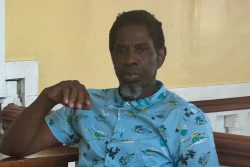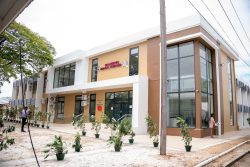If all goes according to the plan outlined by Minister of Education Priya Manickchand last weekend, public schools will reopen their doors to students in grades 10, 11 and 12 on Monday for an adjusted Christmas term, which may also involve rotations in attendance. Minister Manickchand said that the decision to restart face-to-face classes for students in forms 4 to 6, who will likely sit the regional examinations administered by the Caribbean Examinations Council (CXC) next year, was made by Cabinet and followed consultations with the Ministry of Health, medical professionals, CXC, head teachers, teachers, the Guyana Teachers’ Union, parents, students and other stakeholders. She also indicated that all Practical Instruction Centres and those offering Technical and Vocational Education Training will reopen on Monday as well.
All schools and centres were closed in March after Guyana saw its first cases of COVID-19, which at the time was already a pandemic ravaging the world. Continuing education while children were at home proved to be beyond the scope of the ministry and public schools. There were and still are no programmes that are universally accessible to children of all ages and levels. And while this has a lot to do with a lack of preparation by the Education Ministry, it is also on account of the country’s poor electricity infrastructure, dearth of technology and the inability to reach those who live in far-flung areas.
The decision to reopen, Ms Manickchand said at a press conference at the National Centre for Educational Resource Development, was taken because the ministry believed the students needed to continue their education and not become lifelong victims of COVID-19. This was an interesting choice of words, especially given the fact that the minister also admitted, “these are difficult times and no measure will be perfect…” One hopes education certification timelines are not being weighed in the balance here against the possibility of contracting the coronavirus and dying or dealing with its long-term effects. Because then who would the real victims be?
And let us be real, Monday’s limited school reopening is at best a stop-gap measure. It does not consider the students in the lower years, whose formal learning is also being affected.
Further, the minister said that COVID-19 best practices would be in place to ensure the safety of both teachers and their charges. This particular point needed illuminating since there will be no pre-return testing of students or teachers and the best anti-coronavirus method to date, even in the presence of testing, is staying at home. Wearing masks, sanitising hands and surroundings and practising social distancing have to be rigidly adhered to and there will be numerous points of possible exposure and many variables to consider with students and teachers using what passes for public transportation in this country.
The promises proffered in the meetings held with minibus unions and the police were heartening and one hopes that they, or at least not too many of them, do not revert to type. But like the education system in general, the focus of the preparations for school travel appears to be mostly coastal. Obviously, they are intended to cover the entire country and perhaps the minister chose not to disclose the arrangements that would ensure the safety of rural and hinterland students.
Minister Manickchand spoke of schools being weeded and sanitised, sinks for handwashing being installed, sanitising products provided to schools along with thermometers and other items, but omitted a crucial group – the school cleaners. Unpaid, underpaid, mistreated, and ignored for decades, school cleaners were finally regularised as public servants in 2017. They were given daily eight-hour shifts, were to be paid for the holiday periods when schools were closed and their previously meagre salaries were to be brought in line with the public service minimum wage.
In November 2019, this was raised to $70,000 per month by the David Granger administration. However, since this was close to a year after the APNU+AFC had fallen victim to a no-confidence vote in Parliament, the current administration could choose to find it illegal, which would take the minimum wage back to $64,200 per month. Perhaps Ms Manickchand could shed light on this and confirm that the protections discussed also extend to the people whose job it is to keep schools sanitised, bearing in mind that the frequency and intensity of cleaning will now be multiplied many times over.
Finally, one hopes the decision to reopen is not in any way based on the fact that schools have been and are reopening in some Caricom states and other countries. The fact of the matter is that some had reopened only to have to be closed again. The UK is one prominent example. The entire country is under a second lockdown owing to a rise in infections. The management of COVID-19 has varied from country to country. In some places, Guyana included, it appears not to be working as numbers of infections and deaths continue to rise.
Minister Manickchand said that in order for Guyana to not lose educationally, “[d]oing nothing is not a choice we have. That would be irresponsible and reckless and we are neither.” One hopes the minister also recognises that doing the wrong thing can also prove to be both.








